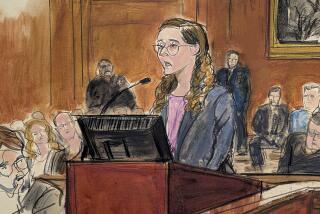A Coverup Again Proves Worse Than the Initial Act
- Share via
On Friday, Martha Stewart painfully discovered what a lot of white-collar crime defendants have learned -- the coverup can get you in more trouble than what you may have done in the first place.
“The iron law of white-collar crime is that most defendants go to jail for something that happens after the investigation begins,” said Columbia University law professor John C. Coffee Jr.
Stewart was investigated for insider trading for her sale of $228,000 in ImClone Systems Inc. stock, but she was never charged with that crime. Rather, she was charged and convicted of obstructing justice, making false statements and conspiracy -- all of which occurred after the federal probe began.
“This is another example of a person being trapped by their effort to conceal information that could show criminal conduct, rather than the conduct itself,” said New York University law professor Stephen Gillers.
Examples range from Watergate -- in which a burglary led to a coverup that ultimately brought down President Nixon -- to the more recent obstruction cases against Silicon Valley investment banker Frank Quattrone and the defunct Arthur Andersen accounting firm, which audited Enron Corp.’s books. Both the Quattrone and Andersen cases focused on actions taken after investigations were underway.
In this instance, Stewart’s stock sale may not even have been a crime, according to Washington attorney Lawrence Barcella, a former federal prosecutor. Indeed, it is possible that the government did not charge her with violating insider trading law because prosecutors believed they had insufficient evidence.
Consequently, the outcome stands for an important principle, though one that may confound many, Gillers said. In order to obtain an obstruction-of- justice conviction, prosecutors are not required to prove that the focus of the original investigation turned out to be a crime.
“You can criminally obstruct the investigation of an innocent act,” Gillers said.
Los Angeles attorney Brad Brian, while emphasizing that he was not minimizing obstruction of justice, expressed reservations about the outcome. “There is something disappointing about a prosecution where the government has not charged the underlying crime,” said Brian, also a former federal prosecutor. “It becomes murky to evaluate whether behavior truly is obstructionist when it’s unclear whether the underlying conduct was a crime.”
Stewart sold the stock on Dec. 27, 2001, one day before the Food and Drug Administration announced that it had rejected ImClone’s application for approval of a new cancer drug. The stock tumbled on the news, and Stewart saved about $50,000 by selling early.
When U.S. agents questioned her, Stewart said she and her broker Peter Bacanovic had a standing agreement to sell the stock when the price fell to $60 a share. Prosecutors asserted this was a false cover story and that Stewart had sold because her broker tipped her that ImClone’s CEO was trying to unload his own stock when he got advance news of the FDA decision.
If Stewart had “simply told the truth,” admitting that she had been tipped, she probably could have settled the case by pleading to one count of making a false statement and paying a fine, Coffee said. Instead, she is now a convicted felon facing prison and “will never again be able to head her company or any other company,” he said.
“She’s the kind of person who can’t admit she did something wrong and got herself in a deeper hole,” said Coffee, who is an expert on corporate fraud.
Washington lawyer Barcella said Stewart sank herself by succumbing to one of the most basic of emotions -- fear.
“It is pretty clear that people who come under government investigation panic and sometimes the panic causes them to get into more trouble than what the government was looking at in the first place,” Barcella said.
Loyola Law professor Laurie Levenson agreed. “If she hadn’t panicked and just told the truth, she would have walked away with no charge. It certainly wasn’t worth the money she made on the sale.”
Levenson said it was clear Stewart lied, but she suggested that part of the populace will continue to “wonder if this was fair even if she was guilty. Many people will think it was a technical offense.”
“Do I think she committed a crime? Yes,” said Levenson. “Do I think prosecutors exercised their discretion to go after her more aggressively than the ordinary miscreant investor? Yes.” Perhaps most important for the government, Levenson said, “the deterrence value [of Stewart’s conviction] is enormous” because of all the ensuing publicity.
Unless lawyers win an appeal for the symbol of gracious living, Levenson said, Stewart “temporarily will be decorating a prison cell.”
More to Read
Inside the business of entertainment
The Wide Shot brings you news, analysis and insights on everything from streaming wars to production — and what it all means for the future.
You may occasionally receive promotional content from the Los Angeles Times.










